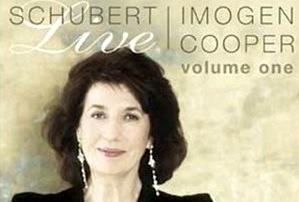Avie Records has begun a new series of recordings of Schubert’s late piano works, featuring the estimable pianist Imogen Cooper, who has recorded little in recent years. Volume I is just out, containing five important and varied Schubert compositions on a pair of CDs (AV2156).
The first CD contains the big A Major Sonata, D. 959; the tiny 11 Écossaises (contredances in a Scottish style), D. 781; and the profound Drei Klavierstücke, D. 946. Two large sonatas make up the second CD: the dramatic A Minor, D. 845, and the sunny D Major, D. 850. All these works were written between 1823 and 1828, the year of the composer’s death.
Pianist Imogen Cooper was for years a kind of house pianist for Philips Records, specializing in German classics. I recall some splendid Mozart concertos and Haydn sonatas from her, as well as the occasional bit of chamber music playing. But she rather got shoved out of Philips’ nest once the firm hired her teacher, Alfred Brendel. Well, she’s back and playing some quite individual performances that cast new light on Schubert.
That these were recorded live at London’s Southbank Center may have something to do with their feeling of spontaneity. They’re not the kind of studied, controlled performances that Cooper recorded in yesteryear. On the minus side, they can occasionally sound a tad self-willed, but at least that breathes a touch of personality into the playing.
Listen to the Music
3 Klavierstücke, No. 1 in E flat minor
The big A-Major — second of the trilogy of giant sonatas from 1828 — is uncommonly assertive, whereas one commonly hears this sonata played introspectively. Cooper uses the free phrasing and extreme dynamics that link the work to Beethoven’s late sonatas. She also stretches out the slow movement, marked as a moderate Andantino, to something akin to an Adagio. Odd, yes, but in context these shifts are emotionally very effective.
Cooper is less rhapsodic when playing the grim A-Minor Sonata. This is Schubert piano music aimed at fans of his big lieder cycle Winterreise, by turns tragic or defiantly angry. Cooper is quite effective in capturing the sense of inner desperation in this score, and at the same time playing past what too often can sound like the piano reduction of what should be an orchestral score.
Speaking of unfinished, Schubert worked so quickly that on his death there were at least a hundred works sitting there, scarcely half made up. Many were left without even a title on the score. Most of those unfinished remained on shelves, unpublished for about 50 years.
When in the 1860s there turned up an unfinished third set of Schubert’s piano Impromptus, it was given to Brahms for editing. The first two sets each have four movements, laid out more or less as sonatas. Yet Schubert finished only the first three of what would have been four for his third set. Brahms, by nature cautiously shy of any criticism, chose to name the score for its 1868 publication, blandly, simply as Three Piano Pieces.
That has got to be the most understated title in all piano music, for the last three Impromptus amount to one of Schubert’s greatest, most moving piano compositions. Calling them simply Three Piano Pieces suggests nothing of their majestic inspirations or length ... which is about 24 minutes. Of course, I may be a mite prejudiced since they’ve been a favorite of mine since my teens — what some people might refer to as their “favorite song.”
By extreme contrast, the charming 11 little dances of the Écossaises are all just lightweight party music, yet so informed as to be utterly infectious. Each is played without pause, as one block of music running only a total of 4½ minutes.
Whereas the piano seems almost incidental to the music on the rest of this program, the virtuoso D-Major Sonata is all about piano playing. Its four movements were composed in an alpine spa town where Schubert was vacationing. With its smiling themes and hints of distant hunting-horn calls, the sonata carries something of the aroma of pastoral summer. Unlike his other sonatas, there are no dark shadows hiding in corners, none of those sudden slippages into sad, minor keys.
The release comes with a scholarly set of notes, all in English, French, and German. And of course, coming from the BBC, the sonics are first-rate, not an easy feat for music recorded live in a large hall.

